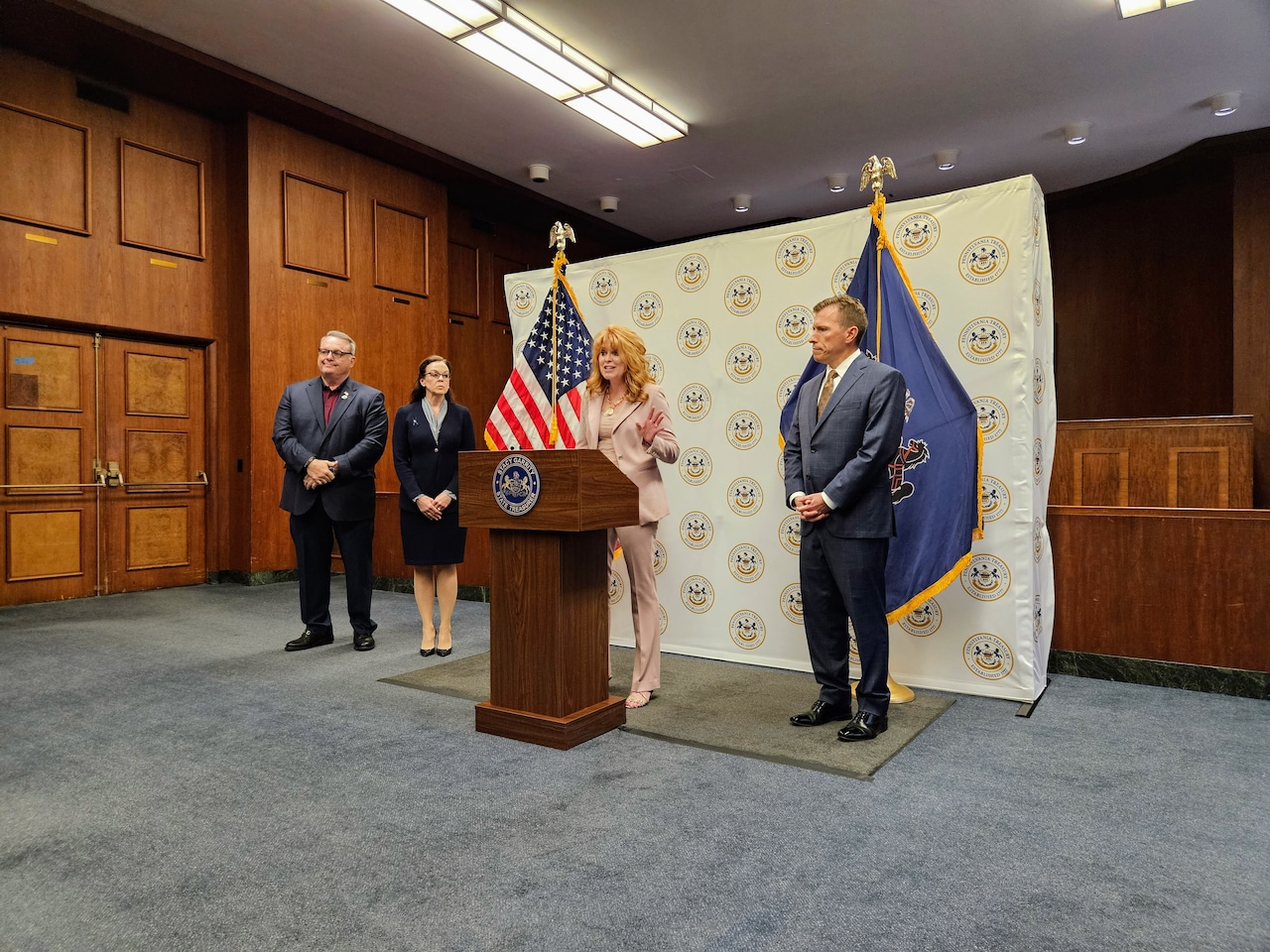Pa. Treasury to start $500M loan pool for counties, Head Start as budget impasse continues

The Pennsylvania Treasury plans to loan a half-billion to counties and preschool providers who haven’t yet gotten their normal funding from the state because of the nearly-three-month-long budget impasse.
Treasurer Stacy Garrity announced the loan program at a press conference Wednesday, saying her agency would be reaching out to county governments and Head Start providers in the coming days to assess their needs and help them apply for funds.
“Pennsylvanians who count on these services should not pay the price for a late state budget,” Garrity said.
The loans will allow the local agencies to “cover immediate operating expenses and keep critical programs from shuttering,” Garrity said, adding that “it’s our job to ensure these services don’t feel the impact of a missing state budget.”
Garrity can’t create money out of thin air, and can’t give it away for free. The $500 million loan fund will come out of treasury account 999, the liquid asset pool that makes short-term investments with the state’s day-to-day operating cash.
That account’s balance is about $21.3 billion, according to public treasury data, and moving a half-billion of those dollars to the new loan vehicle should not cause any cash flow issues, Garrity said.
The loans will made at 4.5% annual interest, Garrity said, and will have to be repaid beginning 15 days after a state budget is signed by Gov. Josh Shapiro and the borrowers receive their 2025-26 state appropriations.
That rate of return is similar to the money market investments where most of the liquid asset pool’s dollars are parked, and Garrity said that making the alternative investment in local government is well within her legal authority to manage commonwealth funds.
“There are some – certainly smaller counties or counties that have less cash reserves – that are already going out to borrow” due to the lack of state assistance, said Lancaster County Commissioner Josh Parsons, one of several county officials who spoke alongside Garrity Wednesday.
“I don’t know what those rates are, but my guess is that those rates are going to be higher than 4.5%, so I think this will be attractive to [those counties],” Parsons said.
A late state budget is typically a slow burn of problems. Even without appropriations for the new fiscal year, the state by law must continue to pay its employees and pay out for certain services that it is legally mandated to maintain.
These stopgap expenses for the yet-unfunded 2025-26 fiscal year have already totaled $16.5 billion since the close of business on June 30, when last year’s budget lapsed, according to treasury data.
But other agencies aren’t as lucky. The social services run by county governments — mental health, addiction treatment, child abuse intervention, among others — are largely funded by the state through year-to-year grants. Without a new state budget, counties don’t receive that funding, and must cover the expenses out of their own local tax dollars.
“The reality is that in many other counties, they simply do not have the financial resources to continue these services without the kind of financial lifeline the treasurer has announced today,” said York County Commissioner Julie Wheeler, who also serves as the treasurer of the County Commissioners’ Association of Pennsylvania.
Head Start is a joint state-federal program that provides early education to low-income kids. Pennsylvania’s regional head start agencies receive about $91 million per year in state assistance, according to the budget.
Garrity acknowledged that the $500 million loan pool is far smaller than the total need during a lengthy budget impasse, and that Head Starts and county governments aren’t the only agencies that could use help. Pennsylvania’s local school districts are also starting to face solvency issues.
“We know there’s a lot of need in the state, and we’re certainly willing to entertain conversations with other groups, but we needed to start somewhere and we wanted to act quickly,” Garrity said.
While Garrity described the new loan program as the “first of its kind,” she also said it wasn’t entirely out of left field. State treasurers have often shifted money between different state funds to cover shortfalls, particularly during the era when the running balance in the state’s general fund was near-zero.
This often required money from other funding pools, earmarked for longer-term use, to be loaned to the general fund to cover shorter-term expenses until more revenue came in. Garrity’s plan takes this a step further, extending the loans not just to other state funds, but to other public agencies that aren’t under the state’s direct control.
Garrity is the front-runner for the Republican nomination to challenge Shapiro, a Democrat, after she was endorsed by the state GOP committee this past weekend.
But the loan announcement was not a political maneuver, Garrity said — although she did use the opportunity to echo Republicans’ general critique of Shapiro’s budget framework, that it would run too large of a deficit and eat into the state’s funding reserves too quickly.
“I’m standing up here as Pennsylvania State Treasurer, not as a candidate for governor,” Garrity said, adding that it’s her obligation as treasurer to provide financial solutions such as the one she just announced.
“In fact, if I wanted to make it political, I wouldn’t do any of this,” Garrity posited, given that a collapse of local government services would put even more pressure on Shapiro to accede to a deal with the Republican-majority state Senate.
The Democratic-majority state House is scheduled to return to session in Harrisburg next week, and the Senate the week after that, although a path forward in budget negotiations remains uncertain.



